Publications
-
Aiding War: Foreign Aid and the Intensity of Violent Armed Conflict (with Michael Findley, Joseph K. Young, and Daniel Strandow) (2023)
Abstract
Does foreign aid reduce violence during ongoing wars? In the policy community, there has been growing optimism about the prospect for aid to improve conflict-affected and fragile areas. We investigate whether foreign aid decreases, or even increases, violence during ongoing armed conflict. We advance a theoretical argument that concentrated foreign assistance allocated during ongoing armed conflicts increases military fatalities but decreases civilian fatalities. Using geographically coded data on all sub-Saharan African countries in conflict between 1989 and 2008, within a matching frontier design and supplemented by instrumental variable analysis, we find strong substantive and statistical support for our expectations about military conflict intensity though less support for the expectations about civilian fatalities. The paper provides novel insights about the effects of concentrated aid on military versus civilian conflict intensity, characterizes the effects at a sub-national level, and expands the spatial-temporal period of the analysis. We also probe the plausibility of the causal mechanism using interview evidence drawn from ex-commanders of the Lord’s Resistance Army and generals of the Ugandan People’s Defence Forces in northern Uganda. The paper offers both academic and policy insights, including that foreign aid allocated during ongoing wars may be more problematic than it is helpful.
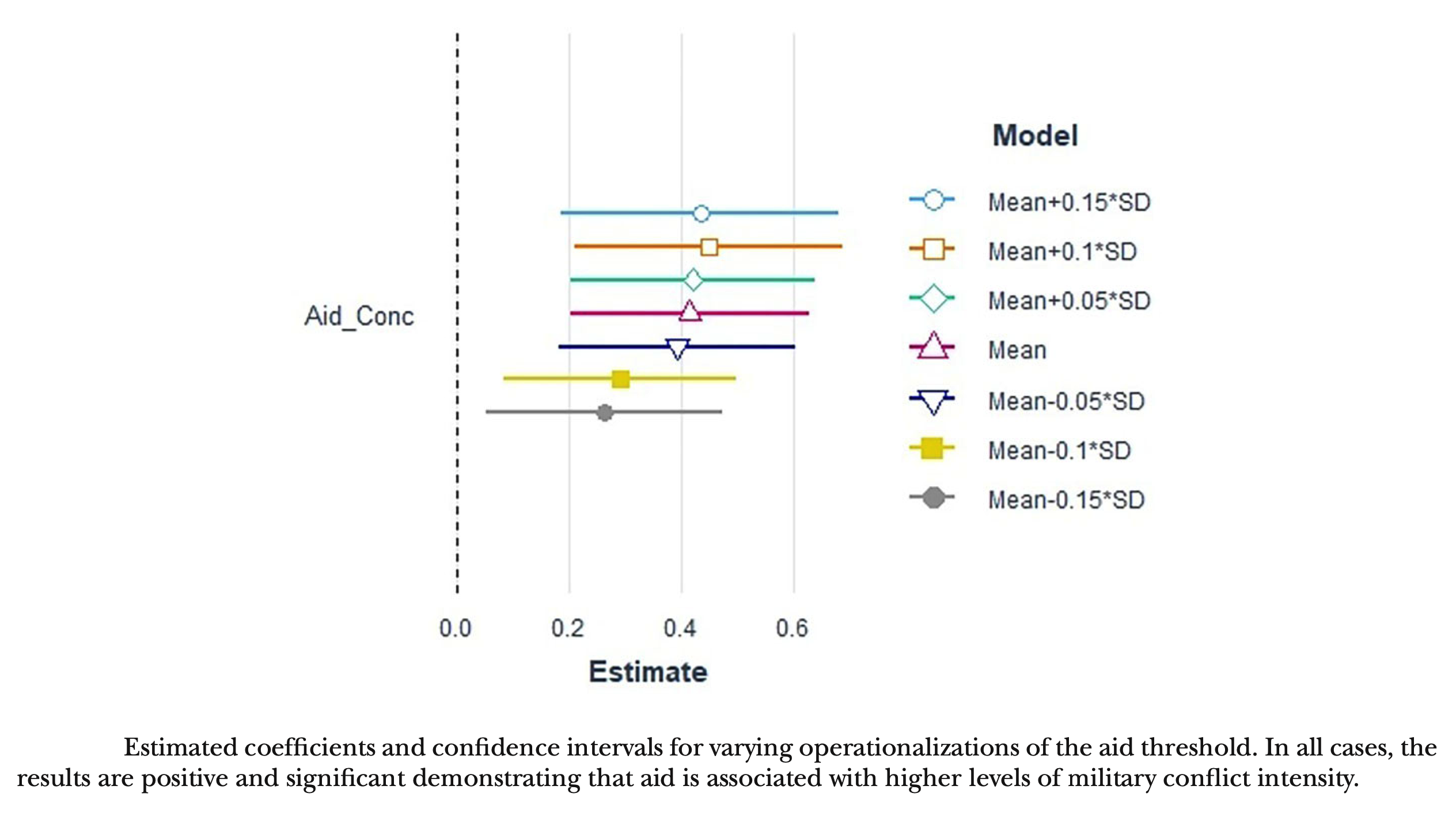
-
A Field Experiment Using Social Media Ads to Encourage COVID-19 Vaccination (with Jiseon Chang, Roman Hlatky, Huimin Li, and Daniel L. Nielson) (2024)
Abstract
Behavioral nudges in Facebook ads reached nearly 15 million people across six diverse countries and, consequently, many thousands took the step of navigating to governments’ vaccine signup sites. However, none of the treatment ads caused significantly more vaccine signup intent than placebo uniformly across all countries. Critically, reporting the descriptive norm that 87% of people worldwide had either been vaccinated or planned vaccination—social proof—did not meaningfully increase vaccine signup intent in any country and significantly backfired in Taiwan. This result contradicts prominent prior findings. A charge to “protect lives in your family” significantly outperformed placebo in Taiwan and Turkey but saw null effects elsewhere. A message noting that vaccination significantly reduces hospitalization risk decreased signup intent in Brazil and had no significant effects in any other country. Such heterogeneity was the hallmark of the study; some messages saw significant treatment effects in some countries but failed in others. No nudge outperformed the placebo in Russia, a location of high vaccine skepticism. In all, widely touted behavioral nudges often failed to promote vaccine signup intent and appear to be moderated by cultural context.
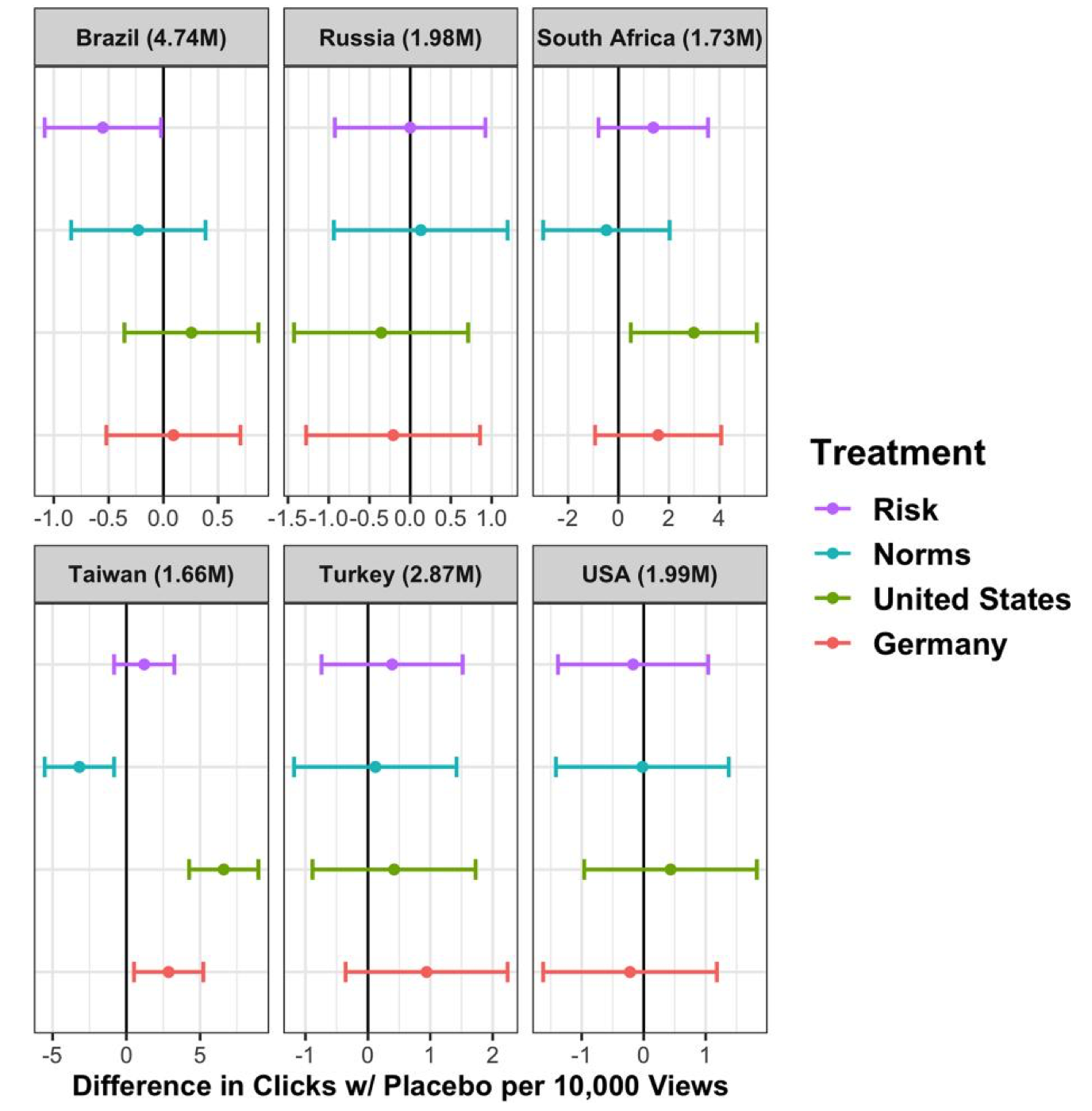
Working Papers
-
Fleeing (in)voluntarily: How Projected Patriotism Affects Attitudes Towards Conflict Migrants [JMP]
Abstract
What shapes attitudes towards conflict migrants? A growing literature points out the events that cause displacement, which can be grouped as voluntary (economic migrants) and involuntary (refugees), and the latter has been shown to elicit more positive attitudes than the former. The effect of common conflict types such as civil war, invasion, or gang violence, which does not immediately signal deliberate targeting as in the case of ethnic or religious persecution, is yet to be tested. Further, the distinction between voluntary and involuntary migration is based on assumptions that need to be addressed. While involuntary migration is argued to attract more sympathy than voluntary migration, I argue that fleeing conflict events such as civil war, invasion or gang violence, which constitute the main driver for the majority of forced displacements is not necessarily perceived as an involuntary act. To explain when and how people perceive it as a voluntary act, I introduce the concept of patriotism called Projected Patriotism. People who embrace this notion expect citizens of other countries to act in patriotic ways and judge them accordingly, shaping their attitudes toward refugees. Employing conjoint survey experiments in the United States and Turkey, I test these hypotheses. While conflict refugees are preferred more than economic migrants, the evidence suggests that this preference disappears with individuals with high Projected Patriotism in Turkey. The findings challenge the existing understanding about what constitutes voluntariness of migration and its effects on attitudes.
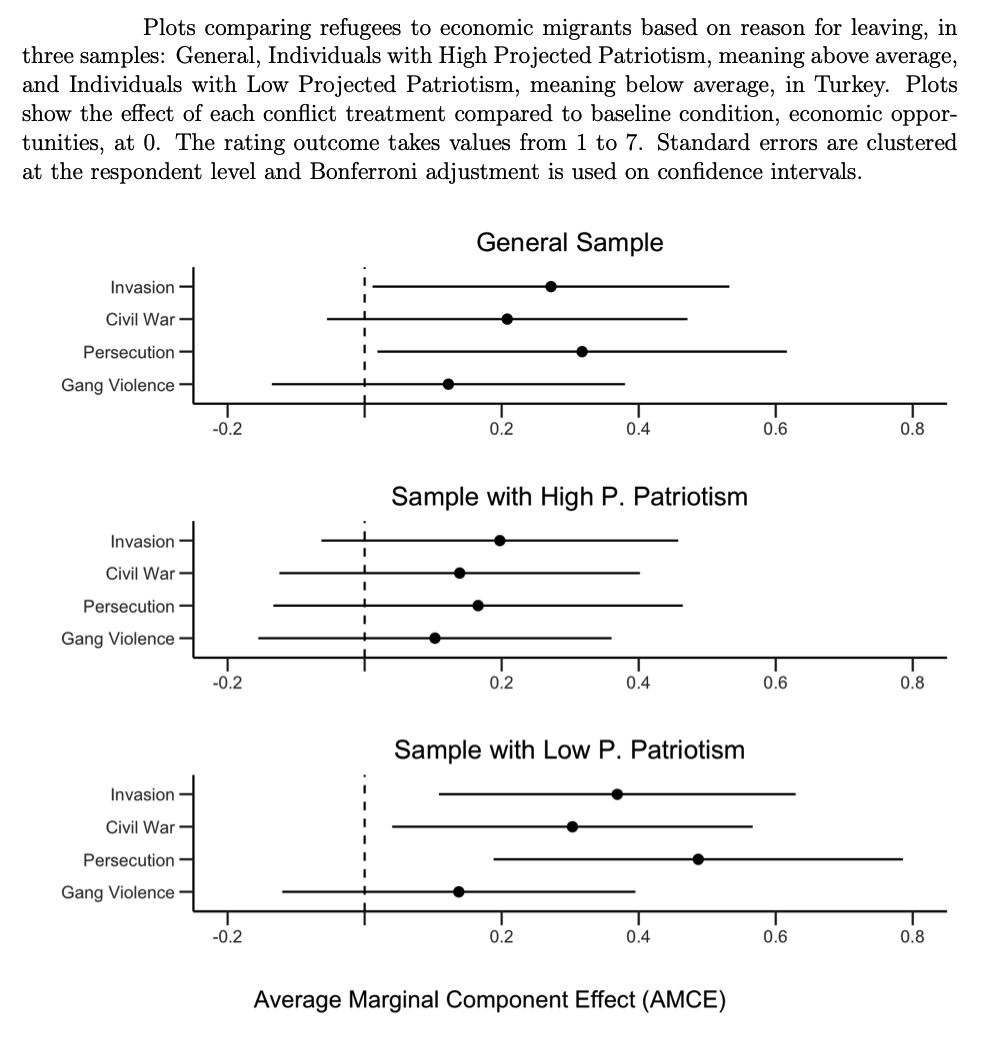
-
Projected Patriotism and Its Determinants [Under review]
Abstract
What do individuals expect regarding the patriotism of others, especially those outside their own national group? While existing research has focused extensively on one’s own attachment to the nation—ranging from blind loyalty to constructive critique - less is known about the normative expectations people hold about others’ patriotic feelings. This paper introduces Projected Patriotism, defined as the belief that outgroup members, particularly migrants, ought to exhibit patriotic attachment to their country of origin. I hypothesize that Projected Patriotism operates as a distinct, outward-facing dimension of national identification, shaped by symbolic attachments and political context, and that exposure to elite threat rhetoric increases its expression. The study tests these hypotheses in two diverse national contexts: the United States, a developed liberal democracy with institutionalized refugee vetting, and Turkey, a developing country facing large-scale, visible refugee arrivals linked to regional instability. Quantitative analysis reveals that Projected Patriotism is moderately correlated with Blind Patriotism but remains conceptually distinct, reflecting moral expectations rather than personal loyalty. Elite rhetoric framing refugees as threats - economic and cultural in the U.S., security and economic in Turkey - significantly heightens levels of Projected Patriotism. Furthermore, stronger affective attachment to national symbols consistently predicts greater endorsement of Projected Patriotism across both contexts. These findings have important implications for understanding attitudes toward migration voluntariness. Individuals high in Projected Patriotism may be more inclined to question the deservingness of refugees when their flight is viewed as a voluntary choice rather than an involuntary necessity. This highlights Projected Patriotism as a contextually responsive and symbolically grounded attitude that shapes public opinion about migrants’ loyalty and worthiness, offering important contributions to scholarship on national identity, migration politics, and political polarization across varied political settings.
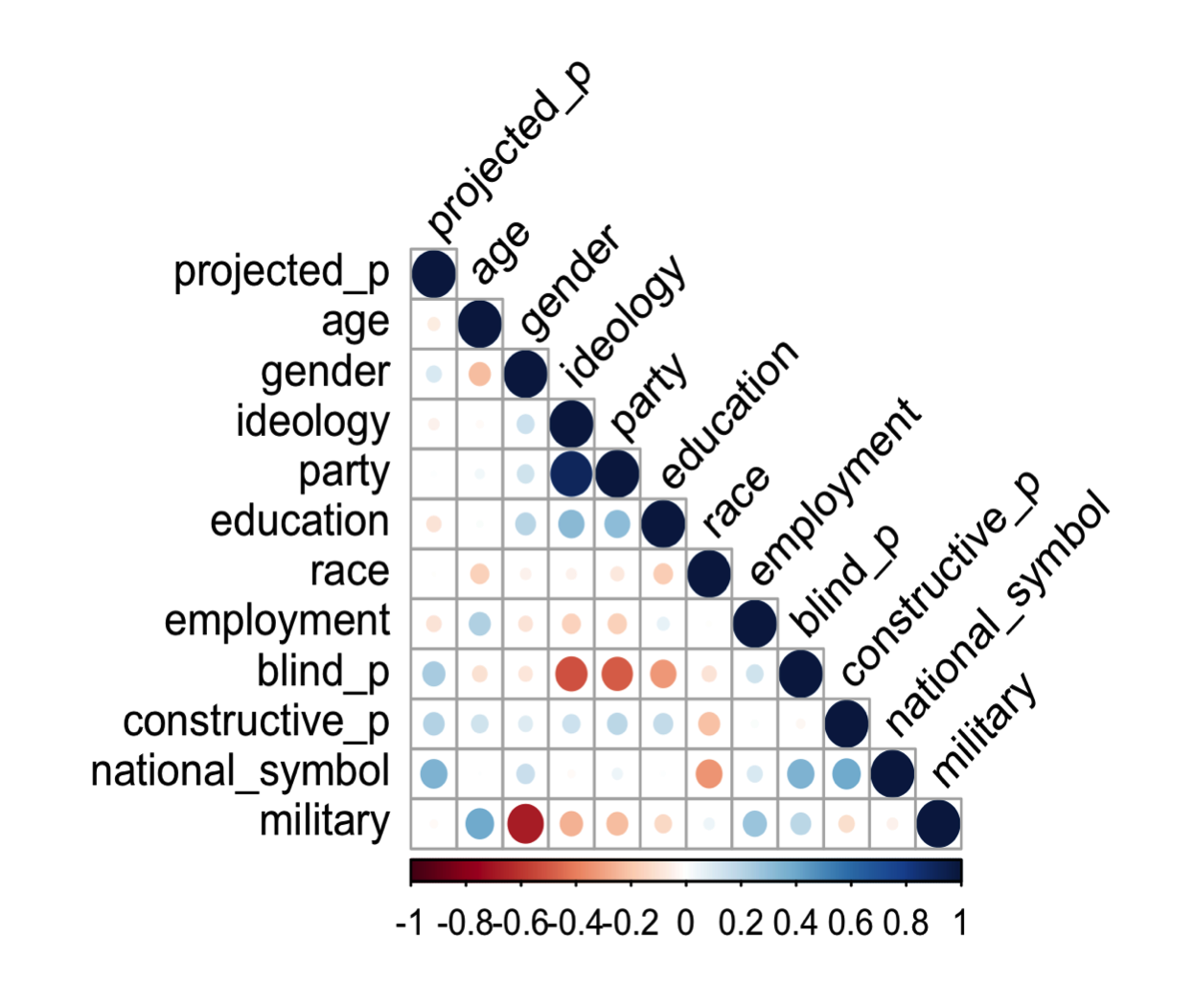
-
Decoupled Association: Terrorism, Extreme Threat, and Immigration Attitudes [Under review]
Abstract
A large literature shows that terrorist attacks generate public back- lash against immigrants and related outgroups. These findings are typ- ically interpreted as plausible responses to violence when perpetrators are themselves immigrants or are widely perceived as such. Yet this assumption has become increasingly untenable. Since the mid-2000s, the majority of Islamist terrorist attacks in Western Europe have been carried out by native-born citizens rather than first-generation immi- grants, creating a disconnect between the attributes of perpetrators and the outgroups that absorb public hostility. This paper asks whether anti-immigrant reactions to terrorism persist even when the factual ba- sis for associating immigrants with violence is weak. I define decoupled association to capture a process in which extreme threat activates neg- ative attitudes toward immigrants despite the erosion of factual overlap between perpetrators and immigrant status. I test this argument us- ing the November 13, 2015 terrorist attacks in France, exploiting their quasi-random timing within Eurobarometer 84.3 as a natural exper- iment. Across a broad set of outcomes capturing both immigration policy preferences and social hostility, exposure to the attacks produces robust negative shifts in attitudes toward immigrants and refugees, and - most strikingly - are highly homogeneous across ideological, social, and demographic subgroups. This pattern contrasts with much of the prior literature, which emphasizes heterogeneous responses moderated by these subgroups. Taken together, the findings suggest that under conditions of extreme threat, heuristic-based attribution overwhelms deliberative reasoning, sustaining anti-immigrant backlash even when the empirical link between immigrants and terrorism has effectively col- lapsed.
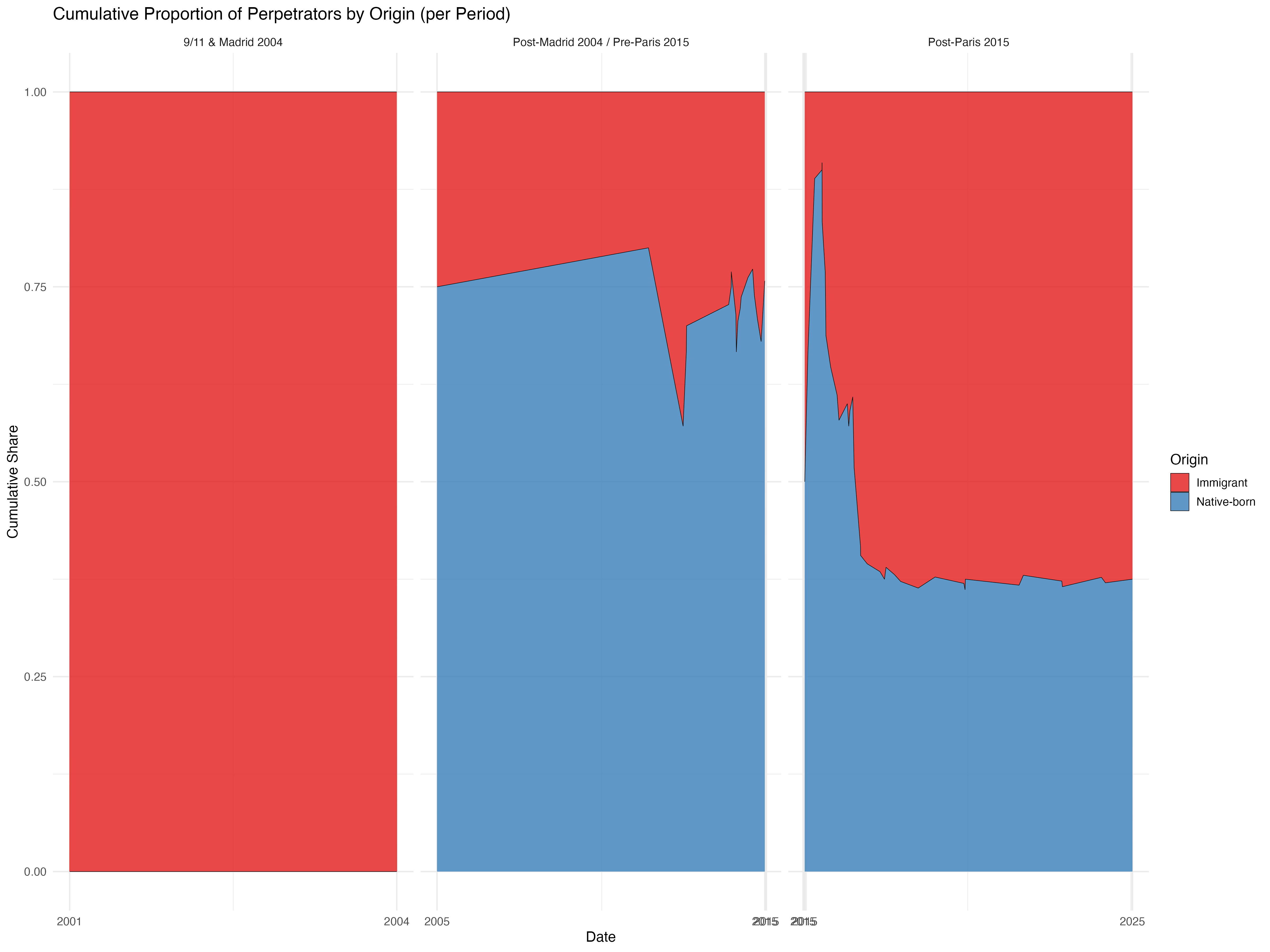
-
Language and Voting Behavior among Asian Americans: The Case of the 2024 US Presidential Elections (with Amy Liu, Jangai Jap, Keith Chew and others) [Under review]
Abstract
Survey data from before the 2024 election about Asian American voting behavior did not match exit poll numbers. What explains this discrepancy? In this note we argue there are methodological limitations – specifically with the data collection process. Existing surveys systematically under-sample English-limited Asian Americans – a population that is almost 44% of the community. Consider how less than 2% of the Asian respondents in the CMPS took the survey in an Asian language. Since linguistic proficiency is not randomly distributed, what this means is that research on Asian Americans is largely biased towards liberals and Democrats. We fielded an original survey that draws on extensive, targeted recruiting of the Asian American community (N=4956) – of which 28% of the respondents took the survey in a non-English language. Our results not only match exit polls but also highlight – on average – a 14% gap in Democrat support between English and non-English language speakers in the Asian American community. This note offers a workflow for future researchers to think about how to sample non-English speaking communities in the US with minimal financial barriers.
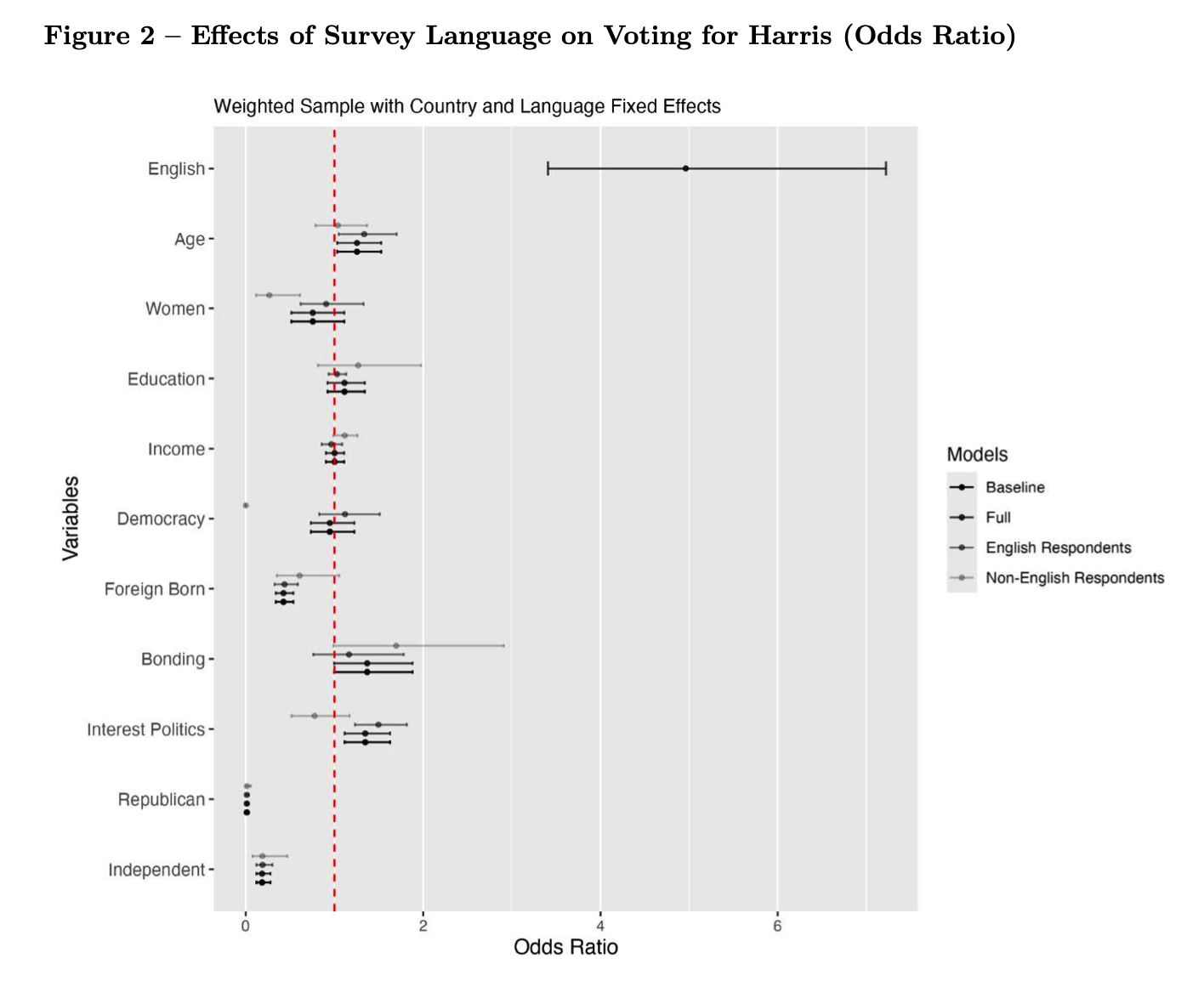
-
The Legitimacy of Wartime Emigration: Evidence from a Conjoint Experiment in Ukraine (with Betty Compton, Roman Hlatky, Holly Jansen, Amy Liu, and Eoin Power) [Pre-submission]
Abstract
Why do some citizens support wartime emigration while others oppose it? Wartime emigration activates moral heuristics grounded in perceived vulnerability, civic duty, and merit. These heuristics shape judgments of departure legitimacy, depending on who leaves, why, and under what conditions. Prior research largely focuses on how host-country publics respond to immigrants, leaving open how wartime emigration is judged by those who stay behind. They offer a broader framework for how moral expectations structure emigration decisions during crisis. The legitimacy of exit during armed conflict poses moral and political dilemmas for those who remain; leaving may signal vulnerability and necessity or suggest disloyalty and avoidance of obligation. We field a paired-profile conjoint experiment in a 2023 survey of Ukrainian citizens to examine how the identity and motivations of emigrants shape public evaluations of wartime departure. Respondents evaluated hypothetical profiles on support for departure, perceived right to leave, and preference for government restriction. These outcomes reflect distinct moral intuitions about compassion, entitlement, and obligation. Judgments reflect overlapping heuristics of humanitarian concern, civic obligation, and merit-based recognition. Mothers fleeing bombardment receive strong support, while conscription-age men receive lower support, especially when departure is framed as voluntary. Highly educated or urban profiles elicit ambivalence, as their symbolic contribution to national cohesion may heighten perceptions of loss when they emigrate. These findings show how wartime conditions structure civic expectations and inform moral assessments of emigration. We argue that such judgments are structured by civic obligation, vulnerability, and perceived necessity. Departures viewed as elective rather than survival-driven provoke sharper moral resistance, particularly when civic expectations of sacrifice remain salient under threat.
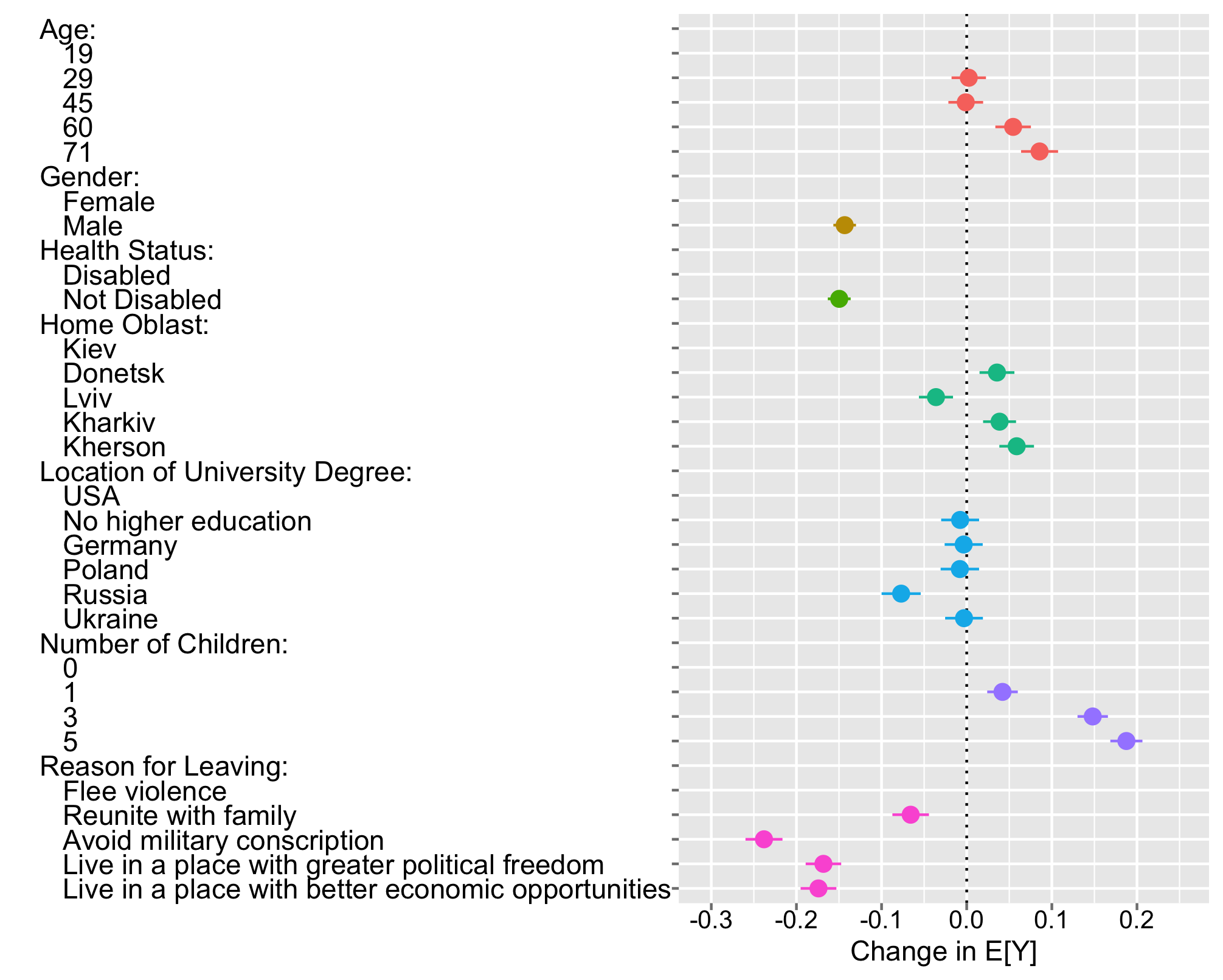
-
Moral Judgments Under Fire: Gender, Ethnicity, and Recognition in Ukraine (with Betty Compton, Roman Hlatky, Holly Jansen, Amy Liu, and Eoin Power) [Pre-submission]
Abstract
Public judgments about who deserves recognition for contributing to the war effort shape the distribution of honor and legitimacy in wartime societies. We argue that when information about contribution is limited, evaluators rely on identity-based expectations linked to gender and ethnicity to infer sacrifice, loyalty, and competence. Clear evidence of costly contribution can reduce reliance on these expectations. We test this argument with a preregistered paired-profile conjoint experiment fielded in Ukraine in 2024. Respondents evaluated randomly varied profiles and indicated whom a national agency should feature and whether each profile merited state recognition. Signals of high sacrifice, including dying in fighting or defending a city, generate broad agreement and compress identity-based differences. By contrast, ambiguous or loyalty-sensitive statuses receive the steepest penalties and are where gender and ethnic differences are most evident. Gender differences are modest overall and become most apparent when status information is ambiguous. Ethnic penalties are concentrated on Russian profiles, while other minority categories cluster near the baseline. Across outcomes, individuating evidence of costly contribution attenuates identity-based disparities, indicating that recognition regimes are most stratified under uncertainty and converge as signals of contribution become more diagnostic
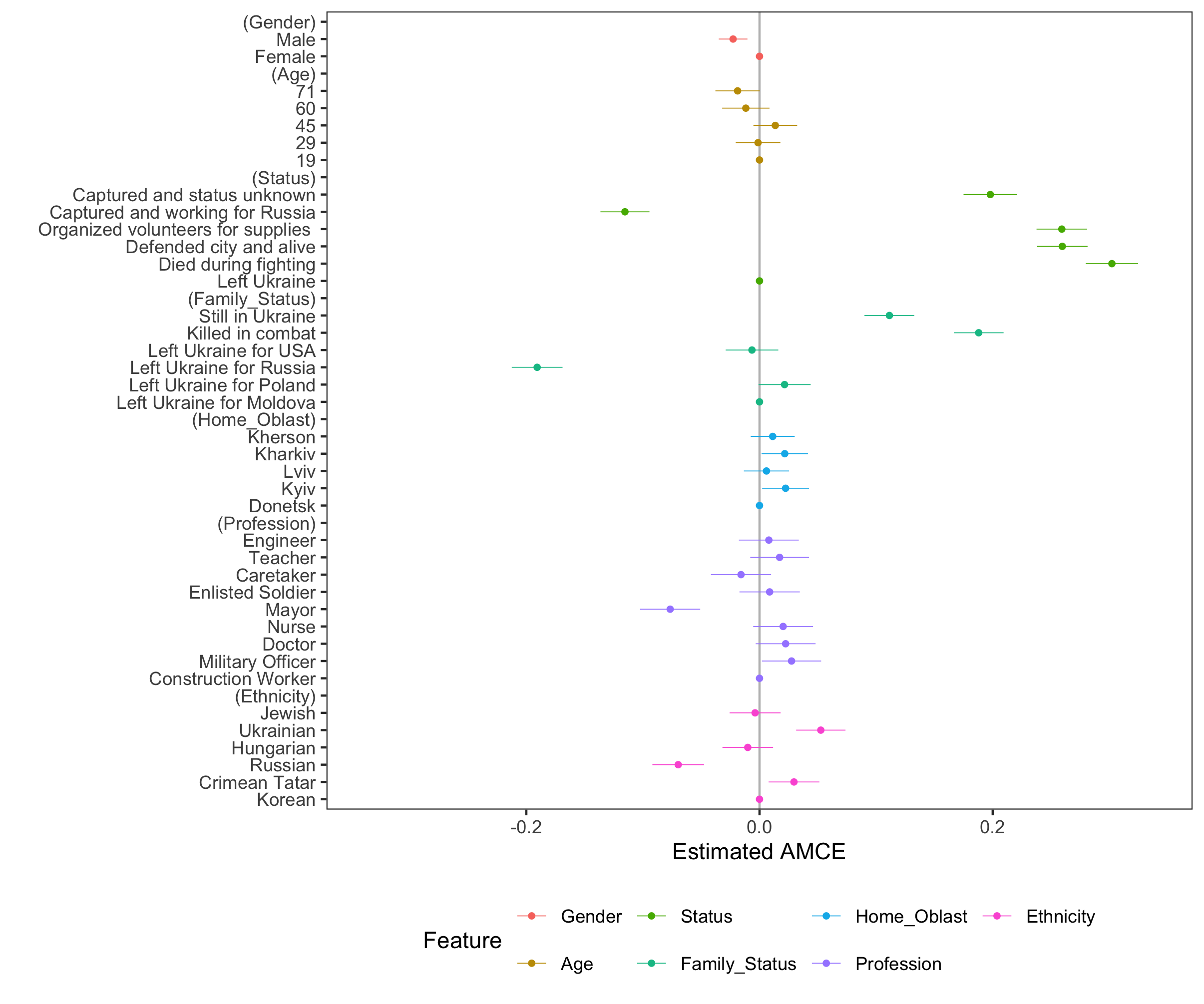
-
Sound And Fury, Signifying Nothing? An Empirical Test Of Russian Influence In Asia And Eastern Europe (with Jiseon Chang, Danny Cowser, Nivedita Jhunjhunwala, Daniel L. Nielson, and Eoin Power) [Data collected]
Abstract
Russia’s incursion into the Donbas in 2014 and its subsequent meddling in the 2016 U.S. election prompted an avalanche of writing on Russian influence and information operations abroad, and now, following Russia’s invasion of Ukraine in 2022, the topic has never been more salient. But we have little empirical knowledge of how Russia’s supposed influence affects meaningful behavioral outcomes. To address this gap, we execute an online field experiment in Serbia, Turkey, India, Estonia, and Kazakhstan. In all five countries, pro-Russian perspectives play a documented and influential role in shaping public opinion, or there are strong historical, cultural, and strategic reasons for (some) citizens to adopt pro-Russian attitudes. Using A/B testing on Facebook’s ad platform, we solicit donations to an NGO supporting Ukrainian refugees while randomly assigning the accompanying imagery and messaging, and we use click rates on the donation link as our main outcome variable. In doing so, we test two main interventions – appeals to shared suffering, and primes emphasizing strategic links to Russia. And we use a meaningful behavioral outcome to deliver contemporaneous insight into how existing linguistic, cultural, economic, and strategic ties interact with historical perceptions of suffering.
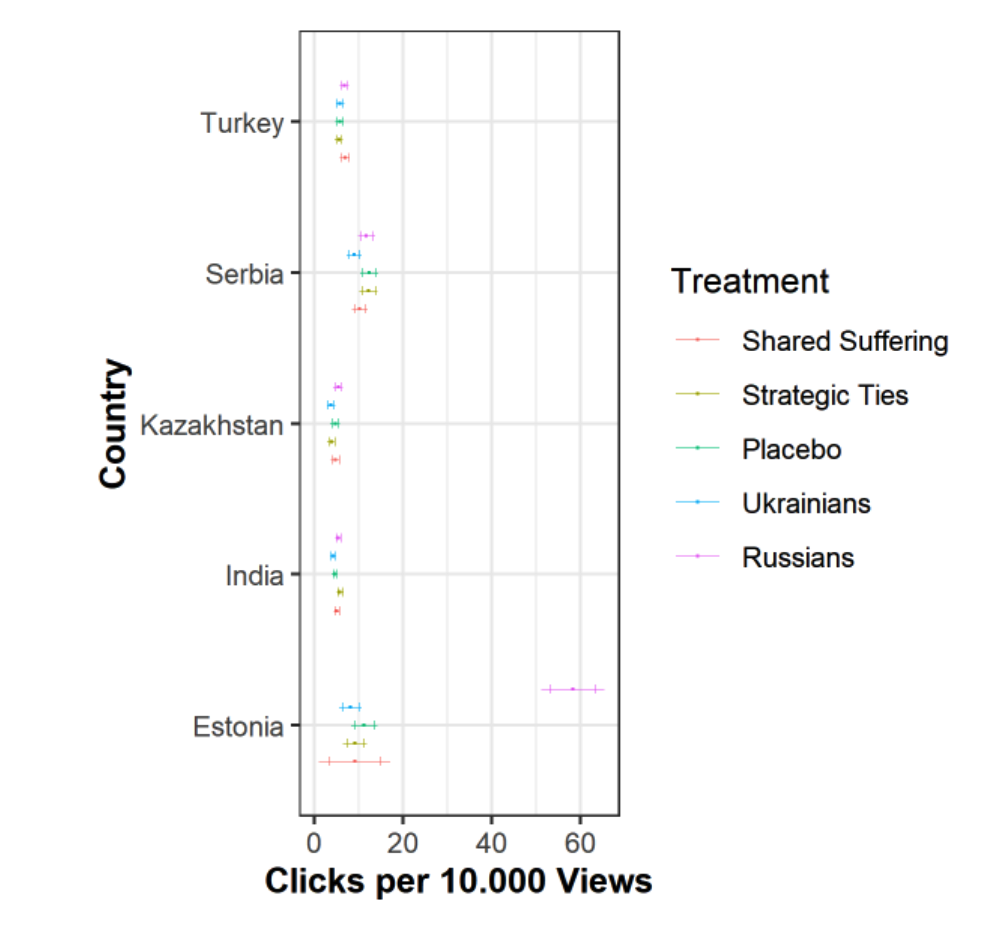
Work in Progress
-
How Does Migration Shape Views on Immigration? A Quasi-Natural Experiment [Pilot]
Abstract
This paper examines how international migration shapes attitudes toward immigration by leveraging a quasi-natural experiment based on the U.S. Diversity Visa (DV) Lottery. Exploiting the near-random selection of migrants, I compare lottery winners who resettle in the United States to non-winners who remain in their countries of origin. Drawing on competing theoretical expectations, I test whether migration experience fosters greater empathy and solidarity with migrants—thereby increasing support for immigration—or whether it reinforces exclusionary boundary-making that distinguishes between legal and unauthorized migrants. Using survey data capturing attitudes toward immigration in both origin and destination contexts, including perceptions of deservingness and legality, this study offers causal evidence on how migration transforms political preferences. The findings contribute to debates on migrant political incorporation, identity formation, and the broader dynamics of immigration attitudes in an era of increasing global mobility.
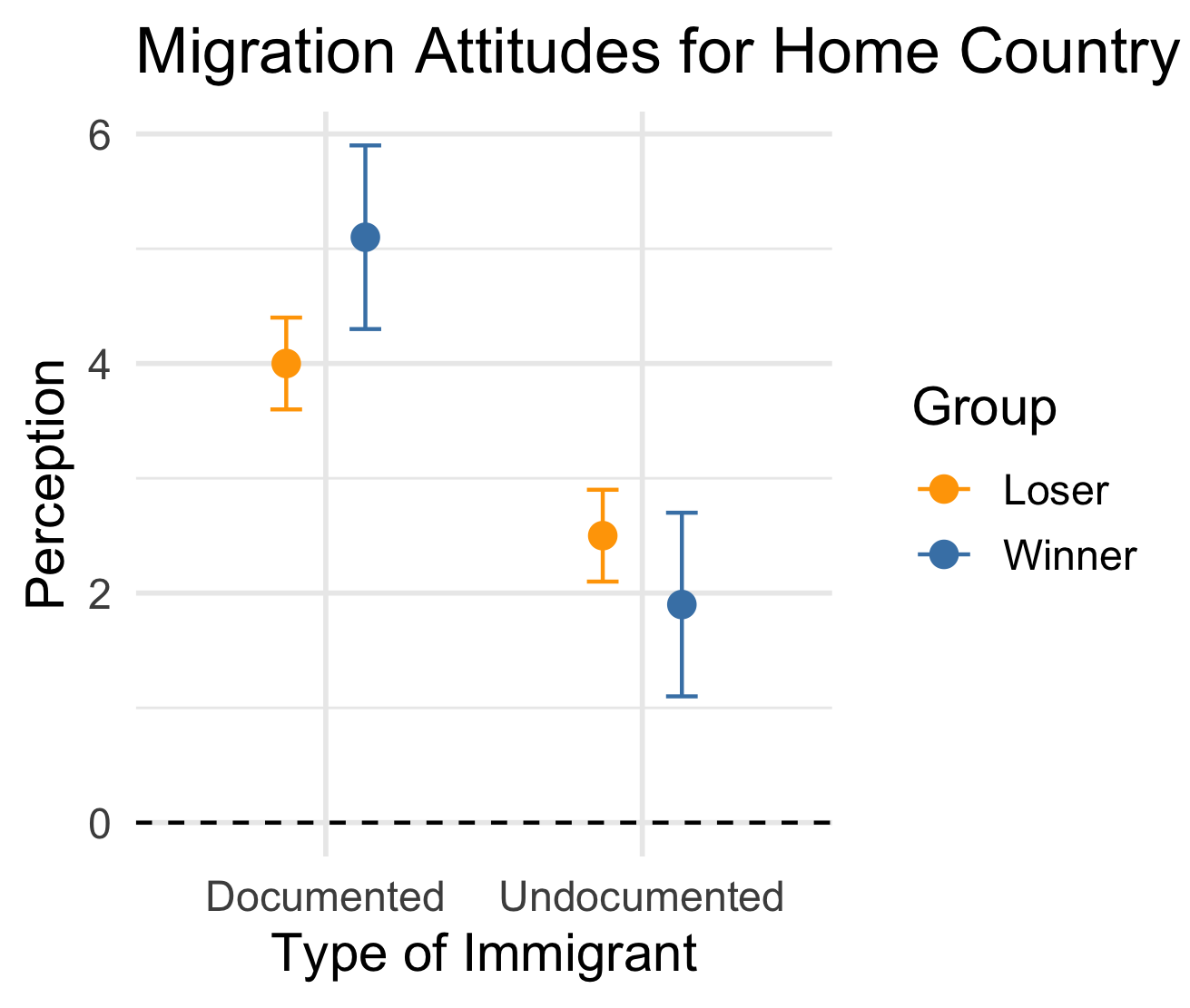
-
AI at the Gates: Public Support for Technology-Driven Migration Governance [Pilot]
Abstract
Governments are increasingly adopting artificial intelligence (AI) to process asylum applications, raising concerns about transparency, fairness, and the legitimacy of decisions affecting vulnerable populations. This study examines how AI use in asylum adjudication shapes public perceptions of procedural fairness and asylum seekers’ deservingness. Using a preregistered survey experiment with a nationally representative sample of U.S. adults, we manipulate three factors: whether the decision is made by a human adjudicator or an AI system, whether the AI system is transparent or opaque, and whether the applicant uses legal aid or an AI-based application tool. We hypothesize that opaque AI decision-making will reduce perceived fairness, that applicants relying on AI tools will be judged as less deserving, and that transparency will attenuate negative perceptions of AI use. Outcomes include fairness assessments, perceived deservingness, support for granting asylum, and trust in the asylum system. This project advances research on forced migration, bureaucratic legitimacy, and the ethics of automated governance, highlighting how technological mediation can alter public support for both institutions and the individuals they serve.
-
Foreign Aid, Border Enforcement, and Public Opinion on U.S. Migration Policy [Pilot]
Abstract
Debates over U.S. migration policy often frame foreign aid to refugee-hosting countries and domestic border enforcement as competing strategies to address forced displacement. This study examines how Americans evaluate trade-offs between these approaches when they are presented as alternative budget priorities. Using a preregistered conjoint experiment with a nationally representative sample of U.S. adults, respondents will evaluate spending packages that vary in foreign aid recipient characteristics, refugee-hosting burdens, aid purpose, and border enforcement type, cost, and framing. We hypothesize that support for foreign aid will increase when recipients host large refugee populations and when aid is framed as preventing onward migration to the United States, but that border enforcement will remain the baseline preference—except when aid is both burden-sharing and migration-preventive. We further expect preferences to vary by political ideology, immigration threat perceptions, and national identity. This project contributes to research on foreign aid, migration politics, and public opinion by testing how strategic framing and policy trade-offs shape citizens’ willingness to support international versus domestic responses to displacement.
-
Home is Where the Bias is: A Field Experiment on Bias in Refugee Housing Search (with Danny Cowser) [Pilot]
Abstract
What drives discrimination against refugees in the housing market? We address this question with a field experiment in measuring landlords’ behavioral responses to rental inquiries. In partnership with Casa Marianella, an NGO serving refugees in Austin, Texas, we collaborate with refugee residents to send realistic, varied messages on behalf of them to landlords advertising properties on major online platforms. We experimentally manipulate three applicant attributes: perceived racial/ethnic identity, gender, and whether the inquiry includes an NGO endorsement - an innovative treatment that signals organizational support and credibility. Messages are crafted to be comparable across conditions while avoiding detection through excessive similarity. Our outcomes capture multiple dimensions of access: whether a reply is received, the length of the response, and the helpfulness of the information provided. This design moves beyond stated attitudes to observe actual landlord behavior, generating causal evidence on how race, gender, and institutional endorsement influence refugees’ access to rental housing in a competitive urban market.